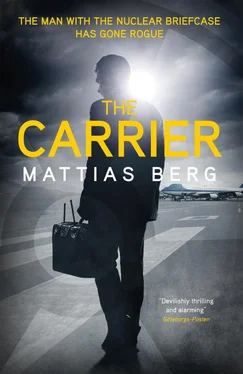Mattias Berg - The Carrier
Здесь есть возможность читать онлайн «Mattias Berg - The Carrier» весь текст электронной книги совершенно бесплатно (целиком полную версию без сокращений). В некоторых случаях можно слушать аудио, скачать через торрент в формате fb2 и присутствует краткое содержание. Город: London, Год выпуска: 2019, ISBN: 2019, Издательство: MacLehose Press, Жанр: Триллер, на английском языке. Описание произведения, (предисловие) а так же отзывы посетителей доступны на портале библиотеки ЛибКат.
- Название:The Carrier
- Автор:
- Издательство:MacLehose Press
- Жанр:
- Год:2019
- Город:London
- ISBN:978-0-85705-788-4
- Рейтинг книги:4 / 5. Голосов: 1
-
Избранное:Добавить в избранное
- Отзывы:
-
Ваша оценка:
- 80
- 1
- 2
- 3
- 4
- 5
The Carrier: краткое содержание, описание и аннотация
Предлагаем к чтению аннотацию, описание, краткое содержание или предисловие (зависит от того, что написал сам автор книги «The Carrier»). Если вы не нашли необходимую информацию о книге — напишите в комментариях, мы постараемся отыскать её.
The Carrier — читать онлайн бесплатно полную книгу (весь текст) целиком
Ниже представлен текст книги, разбитый по страницам. Система сохранения места последней прочитанной страницы, позволяет с удобством читать онлайн бесплатно книгу «The Carrier», без необходимости каждый раз заново искать на чём Вы остановились. Поставьте закладку, и сможете в любой момент перейти на страницу, на которой закончили чтение.
Интервал:
Закладка:
It was not much to look at, either. As I scoped the building, I saw that the roof had collapsed toward the northern gable, where plastic had been riveted—although that too had started to tear due to the weather conditions. Not one window retained both panes of glass. But the doors appeared to be largely intact, so it ought to be possible to shut out the worst of the cold by stuffing extra clothing from our packs into the gaps. When I returned to the group, Niklas glanced at our packs as Jesús María and I lifted them from the sled.
“I assume I don’t need to ask if you’ve got proper gear with you. Bob’s pack is after all bloody gigantic. You can also keep the jumpsuits until you come back to the camp.”
“Awesome, thank you. And so long as you come and get us again tomorrow morning, everything will be just fine,” Ingrid said.
He turned the team of dogs around, said a coaxing “O.K.”, their simple command. A few seconds later they had vanished into the darkness and driving snow. Ingrid led the way to the hut, managed to open the warped door without too much of a problem. Let us go past her, closed the door again and stopped a few paces in, looking around dreamily.
“We used to sit in here and kiss before we could even read. Niklas’ mother had been involved in ‘Operation Sepals’ during the war, one of the most important cogs in the wheel from what I understood: the Germans let the Sami roam free as reindeer over the border, perfect couriers. Then the Tourist Association never bothered to reclaim the hut. The mineral vein runs just under here, you see, so when the company stopped its open-cast work and went underground, there was probably nobody who wanted to sit here rattling as the whole of Mount Doom was blown apart. Except me and Niklas—and eventually just me. Here you can do whatever you want without being watched, in case you’re wondering.”
Jesús María had not said a word. I waited for Ingrid to explain what we were doing out here in the wilderness. But she looked at her watch.
“We certainly wouldn’t need to keep anything from Niklas. You’ve seen what the camp looks like, right? He would never report us to any authority, not a Swedish one and even less an American one, and absolutely no way to the military.”
When Ingrid checked her watch again—no more than five minutes later, still standing over by the door—I did the same. 21.52, December 10. The beginning of the Polar Night and the date of the Nobel Peace Prize ceremonies: all this symbolism. And our crumbling little cottage would be a perfect hiding place when the police started questioning everybody in the immediate vicinity of the slope tomorrow morning, like Bettan for instance.
“But by now Niklas will have stopped thinking about turning around and coming back to fetch us out of this rat-hole, he’ll have gone too far already. And once he’s back at camp, my informants tell me that nowadays it doesn’t take more than a thimbleful before he’s out for the night.”
Then she turned and opened the door, letting in the ice-cold wind and driving snow.
“So it’s time to get to the real meeting place.”
3.10
Ingrid led us, packs on our backs, headlamps lit, straight into the storm. We crouched before the wind, carefully balancing our weight so that we did not break through the snow crust. The cold stung in our nostrils with each breath. The snow kept falling—which should make it nearly impossible for anybody to spot us.
The only thing I could make out was that we were surrounded by thick forest. The dog team must have turned off sharply and headed down the mountainside, before dropping us below the tree line again. Ingrid followed a trail further and further in among the trees. The heavy snow made the branches sag: if necessary we could use the space under them as escape tunnels.
As the storm grew heavier and denser, Ingrid was several times forced to stop and retrace her steps. Counted her paces back and forth, double-checking, stopped by a tree and ran her hand up and down the bark, as if looking for some kind of markings. We kept close behind, so as not to lose sight of her.
After a few minutes she signaled us to halt in what seemed to be a more open place. She wandered here and there with her eyes fixed on the snow—before suddenly sitting down and starting to dig vigorously with her hands, like a child. Jesús María and I did the same. Our winter gloves were clumsy, but there was no doubt a reason why Ingrid chose not to use the collapsible shovel in her combat pack.
Under the snow there was at first nothing but pieces of granite, and then increasingly black composites, laden with magnetite. Only after removing the deep layer of stones on top of the bed-rock could we glimpse the control box in the light of our headlamps. That was why Ingrid had avoided using the shovel, preferred the sensitivity of her hands.
With great concentration she then set about prising open the box with some sort of tool, laying bare the control buttons. The panel was large enough to allow one to key in the code—and, as ever, small enough that one’s hand would cover the movement of the fingers, making it impossible for someone else to read. A dark hole opened up in the snow.
Against the howling wind, Ingrid had to gesture to us to lead the way down. I could see out of the corner of my eye how she erased our trail: stretching one hand up out of the hole to scrabble back in place as much as she could of the natural camouflage, small piles of gravel and diluted iron ore, while the entrance to the tunnel closed above us.
So Jesús María took the lead through the steep, unlit passage, the narrow bore allowing us to place our feet on either side of the fall line even here, almost climbing down the rock wall, like Spiderman. I shivered, pulled myself together. By the time we reached the finished tunnel floor, Ingrid had managed to catch us up. We pulled off our balaclavas and continued in double-quick time along the vehicle track which twisted steeply through the bed-rock. The stalactites hung from the roof like age-old objets d’art. According to my watch it took almost a quarter of an hour for us to reach the lock gates, the depth meter showed dizzying and steadily increasing co-ordinates. Negative 500 feet, 650, 800…
Here too the gates conformed to regulations in every way. Three red steel doors, two for the shock waves and one a gas barrier with a pressure relief valve. Ingrid slipped past Jesús María. I leaned out from our little line to see her take a few deep breaths, shut her eyes. Then she quickly pressed the code on the control box hidden in the rock wall, hurried through the decontamination rooms, past the oxygen cylinders, the changing rooms, hardly sparing them a glance. Once we reached the rest area she turned on the light, switched off her lamp and sank into the circular, flame-colored sofas from the ’70s.
I looked again at my watch. 23.03—and the depth, 1,132 feet. Almost a quarter of a mile. Far deeper than any military installation I had visited.
“Welcome to Pluto. Mount Doom’s hidden core,” Ingrid said.
With some effort she removed her boots and put her feet up on the sofa. Wiggled her toes to get the circulation going again as she started to speak.
“We thought of calling it Uranus, after the God of the Heavens. But then we thought Pluto would be better. The direct opposite: the Romans’ equivalent to Hades, the ruler of the underworld, the kingdom of the dead. And the one who gave his name to plutonium.”
Ingrid paused and began to massage her feet. I watched her breath: puffs of human warmth. The temperature was more comfortable here than outdoors, but it hovered barely above freezing. The dank underground cavern felt so familiar to me, mold and high technology, must with a note of electricity.
Читать дальшеИнтервал:
Закладка:
Похожие книги на «The Carrier»
Представляем Вашему вниманию похожие книги на «The Carrier» списком для выбора. Мы отобрали схожую по названию и смыслу литературу в надежде предоставить читателям больше вариантов отыскать новые, интересные, ещё непрочитанные произведения.
Обсуждение, отзывы о книге «The Carrier» и просто собственные мнения читателей. Оставьте ваши комментарии, напишите, что Вы думаете о произведении, его смысле или главных героях. Укажите что конкретно понравилось, а что нет, и почему Вы так считаете.












